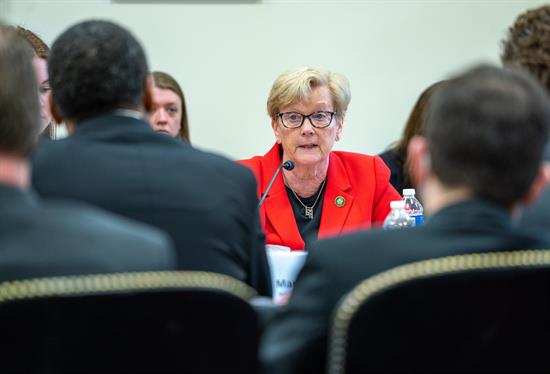Press Releases
VIDEO: In Interior Appropriations Hearing, Ranking Member Pingree, Forest Service Call Attention to Harmful Impact of Proposed Republican Cuts
Washington,
March 23, 2023
Interior, Environment, and Related Agencies Appropriations Subcommittee Ranking Member Chellie Pingree (D-Maine) today called attention to the potentially detrimental impact Republican-proposed budget cuts would have on Americans’ jobs and way of life. In a budget hearing on Thursday, Pingree heard directly from U.S. Forest Service Chief Randy Moore about the how these budget cuts would affect their essential operations, including cutting firefighter jobs that save lives. “We have to treat our employees like we value them. And so whether we cut 2,000 firefighters, or whether we cut 1,000 firefighters or 3,000 firefighters, we want the firefighters we have to have those same benefits that I mentioned there, that this FY 24 budget provides,” U.S. Forest Service Chief Randy Moore told Pingree. “And the same would go for implementing wildfire crisis strategy, where we have a lot of our resource-related positions that are really protecting communities and saving lives. That would be reduced as well.”
Click here to watch the full hearing Based on information the House Appropriations Committee received from agency leaders in the Biden Administration, House Republicans’ reported proposal to cut fiscal year 2024 discretionary spending back to the fiscal year 2022 enacted level—resulting in a cut of at least 22 percent for essential programs—would ship manufacturing jobs overseas and undermine American workers. “If House Republicans follow through with their threats to rollback government funding to fiscal year 2022 levels, up to 4,500 federal wildland firefighters would be furloughed, and the Department of the Interior and the U.S. Forest Service would have no choice but to put their efforts to modernize the workforce and hire additional firefighters on hold. This is plain nonsensical as the climate crisis threatens more and more of our communities,” said Pingree. “From National Forest System operations that are vital for tourism, the economy, and the environment, to fire management efforts that are critically important to protecting the safety of our communities and land vitality—the devastating impact of these proposed cuts cannot be overstated.” These drastic proposed cuts would: Undercut American workers.
Rob workers of back pay.
Make work environments less safe.
More information on how this proposal ships manufacturing jobs overseas and undermines American workers can be found here. +++ Full transcript: Congresswoman Chellie Pingree (CP): I have a couple programs I want to talk about, but I want to just start with the budget here. So last week, in response to a request from our committee, Secretary Vilsack provided a letter that highlighted some of the difficult cuts that would occur at the USDA if we were to return to fiscal year 2022 funding levels. That's been one of the things that's been talked about as we proceed in this budgeting process. So [it’s] certainly my hope we're not going to go there, but I would like to have you highlight some of the challenges you would face if we were to return to fiscal year 2022 levels just so I can better understand the detail of what that would look like. Chief Randy Moore: I have my preference, but we have to do a lot of discussions about where those budgets would come from. But based on where I am right now, if we look at the intent behind the FY24 budget, what we're trying to do is make right to the organization. And if I take firefighters as an example, we're doing a number of things that is really critical for firefighters, not only the pay increase to make it equitable to nonfederal firefighters, but we're also looking at things like portal portal, where we pay other entities to come and help us fight fires. We just want to do the same thing for our employees. We’re looking at mental and mental health and well-being. We’re looking at the housing issue there. And so when we look at those types of things, those are the right things to do for our employees that work so hard. Now, if we were to have a budget cut in those areas, what we would do, what we'd have to do is reduce the number of firefighters, but provide them with the same benefits that I just mentioned because it has to be a correlation. We have to treat our employees like we value them. And so, whether we cut 2,000 firefighters or whether we cut 1,000 firefighters or 3,000 firefighters, we want the firefighters we have to have those same benefits that I mentioned there that this FY24 budget provides. And the same would go for implementing our wildfire crisis strategy, where we have a lot of our resource-related positions that are really getting out and protecting communities and saving lives that would be reduced as well. CP: Yeah, thank you for that and I really do appreciate it. The chair mentioned it earlier and I said it in my opening remarks. The understanding that we have to have our federal firefighters on par with, you know, local and other communities and make sure that we're providing all that support both in wages, but also, as you said, housing and mental health issues, you know, whatever it is, we increasingly understand how valuable this force is to us. ### |

